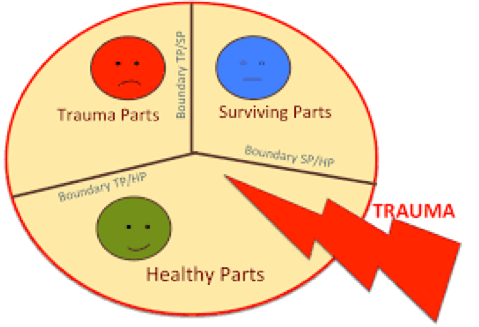Aanbod
Post Intensive Care Syndrome PICS
Surviving after a life-threatening illness
My personal experience
It has been more than 25 years since I was admitted to the Intensive Care Unit of the UMCG in Groningen due to a life-threatening illness. I was a young man in my early 30’s. Affected by Guillain-Barré syndrome (GBS), an acute neurological disease. I was in the Intensive Care Unit for months, of which almost 3 months on a respirator. This was followed by a long period of recovery and rehabilitation in a Rehabilitation hospital. A difficult period for myself and for my loved ones. For such an experience with a life-threatening circumstance affects not only one’s own life but also the lives of the family members most involved in this period.
I survived!
So many years have passed and I survived! And that is probably the best word that describes the entire period after that. At that time (in the early nineties), not much attention was paid to the consequences of long-term nursing and respiration in the ICU. Fortunately, much more attention has been paid to this in recent years. The influence of this on work and personal life is great for many people and is not always understood by the environment. Because you survived anyway! You are often left with misunderstood complaints and problems that sometimes cannot be directly linked to what happened.
Misunderstood symptoms
It is often these misunderstood symptoms that make it difficult to resume ‘normal life’. Symptoms that are no longer directly measurable or can be directly attributed to this event. Over time, a number of people develop a Post Traumatic Stress Disorder, which then has to cover the burden of these often misunderstood symptoms. In 2008, after years of struggle with the benefits agency, the UWV, I was finally diagnosed with Chronic Post Traumatic Stress Disorder and was declared completely incapacitated for work. I was fortunate to meet a psychiatrist who could put my symptoms in a broader context. That gave a lot of peace and stability after all those years of struggle and unrest.
Be able to place this experience in a broader context
Yet I still remained a ‘survivor’ and I did not succeed, to let go of life as it was before I became ill and to accept life as it was now and had to find much more connection with who I have become and not with who I was. It was only when I really dared to work through my traumatic experiences I had gone through in therapy and counseling that it became apparent how I could place this one experience in the much larger context of other experiences in my life. My own ‘trauma biography’. Then the recovery could really take place and I could learn to live instead of survive.
The ‘colors’ of one’s own experiences. Being a male Nurse, Social worker, Psychosynthesis therapist and IoPT practitioner
As a former male nurse, social worker, psychosynthesis therapist and IoPT practitioner and IC survivor, after years of personal process work and professional training, I bring these experiences into the offer that I have included in the Practice for Psychosynthesis Amsterdam for the guidance of clients with PICS symptoms. Because of the COVID-19 Pandemic, the PICS suddenly comes into the picture and I hope that from my personal experiences as a former male nurse and IC patient I can contribute to support during recovery after a life-threatening illness and IC admission. A contribution that not only looks at the experience itself, but also at how this experience can be seen in a broader context of one’s own trauma biography.
Possible symptoms from survivors after an experience of a long admission to intensive care
Physical problems
The so-called IC-acquired muscle weakness often develops in patients who are in the ICU for more than a week. This muscle weakness also often develops as a result of the sedation that must be given to suppress the patient’s resistance to the ventilator. Depending on the reason for the IC admission, serious fatigue complaints and low energy levels can occur even years later. Depending on the severity of this IC-acquired muscle weakness, residual symptoms often remain despite rehabilitation
Cognitive Problems
After an IC admission, problems with concentration and / or becoming overwhelmed by too many stimuli can occur for a long time and sometimes persistently. In the beginning, the patient is often fully focused on his or her physical recovery and these types of problems will often become clear a little later.
Psychological and social problems
- Anxiety
- depression
- Posttraumatic stress disorder
- Disturbed grief processing
- loss of employment
- loss of income
- loss of perspective
Near-death experiences
Some people experience something during their IC admission where there are experiences that they cannot place within their existing frame of reference. Experiences that Pim van Lommel, Cardiologist has well documented and described in his book on Near-death experiences (NDE). These experiences seem to put everything in a different perspective. For some people it is a struggle between ‘here’ and ‘there’ and not knowing what to do with such an experience in this life.
For more detailed information about complaints with Post Intensive Care Syndrome (PICS) I refer to the IC-Connect webpage. The patient organization for (former) IC patients and relatives
“The human psyche is innately healthy. Overwhelming experiences force it to adopt special survival programs that enable it to continue living.”
Franz Ruppert, My Body My Trauma My I, 2018

Desire for recovery
The guidance I want to offer you will not be fundamentally different from the way in which I work with clients in practice as a Psychosynthesis and trauma therapist. It is mainly your personal experience and request for help that determine what you want to work with. It is then my experiences with a life-threatening illness and survival after an Intensive Care admission, which, together with my professional qualities as a therapist and counselor, form the basis where you can continue to work in your experience and request for help.
A radical experience such as admission to intensive care and the way you lived through this experience is an experience that, from my experience, does not stand alone but must always be placed in a broader perspective of the personal (trauma) biography. Because while there will be experiences that will actually be the same for many people, the way you went through this experience depends on how you have learned in your life to deal with things like fear, loss, stress, etc.
We all have experiences of fear and loss. Yet we will all react differently to these experiences. That is why looking together at a broader context of your own trauma biography is an important point of attention in the guidance in working through and processing your personal experiences with illness, loss, fear, death, guilt, shame, primal wounding, etc.
“We don’t see reality as it is but as we are”
That means that I want to invite you to learn to meet yourself in who you are, in what your personal experiences are, both in this traumatic experience with a life-threatening illness and admission to an ICU and in the way you are used to dealing. with how life unfolds on you. A life in which we sometimes have to learn to let go and sometimes even learn to look again.
De Praktijk’s offer is not a ready-made package with practical tools or assignments. No prescribed treatment protocol. I do not pretend to have the answers to all your questions or to be able to “get rid” of all your problems. I can, from my own experience, my own questions and self-lived answers, be present in your desire for recovery to move from survival to full life!
From survival to life to the full!
Together we look at how this experience may have stuck in your experiences as a trauma. We look at which survival mechanisms you have often unconsciously deployed to survive and endure this traumatic experience. This ability of the wise body to survive in a life-threatening situation is something you can be grateful for. At the same time you can realize and become aware that, now that the life-threatening situation is no longer there, the need to survive and thus the function of the survival mechanisms is no longer necessary. Even hindering you from facing your injuries and healing yourself.
IoPT Method for self-encounter
That means that you have to learn to reconnect with the healthy parts of yourself. The healthy self, which when released from the domination of the survival mechanisms, is able to heal itself.
The Identity Oriented Psychotrauma Theory and Therapy is a simple yet powerful method to meet yourself in this inner dynamic between the different parts. IoPT is also called the ‘method of self-encounter. mentioned. The method based on Franz Ruppert’s Psychotrauma Theory is also called the intention method or trauma constellation, depending on where the practitioner followed his or her training. I followed my training with Walter de Vries of Zielsbelang in Culemborg and the follow-up training with Vivian Broughton from London, UK. Read more about IoPT here
Below is the trauma model used in Franz Ruppert’s trauma theory with a brief description of the inner parts involved in trauma. All new clients in the practice receive, for information and in preparation for guidance, the booklet, A clear explanation of the development of trauma and Franz Ruppert’s trauma processing method.
Source: Becoming your true self, a handbook for the journey from trauma to healthy autonomy, Vivian Brougthon.

Trauma part
Preserves the trauma memory, experience and feelings.
Surviving part
- Monitors and maintains the boundaries of the split-off.
- Develops increasingly complex strategies to do this.
- In later retraumatizing situations it will develop new splits if existing survival strategies are no longer adequate.
Healthy part
- Longs for wholeness (integration of the parts)
- Know that something is wrong.
- Trying to heal.
- Seeks help, for example in the form of therapy.